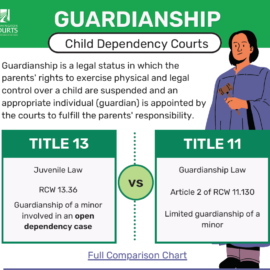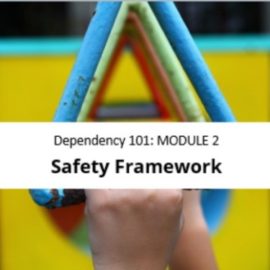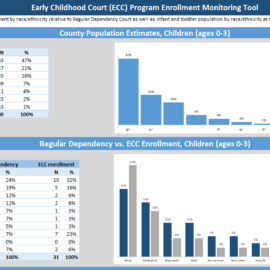The ECC Community Level Indicators document summarizes the contextual community characteristics that may facilitate or impede successful implementation of the ECC. This approach lies within Durlak and DuPre’s ecological framework for effective program implementation, which was originally developed to promote implementation success of community-based health prevention programs. According to this approach, understanding the local environment in which the ECC is operating is important to successful implementation and sustainability of the program. If program staff identify the existing challenges that impact
Domestic Violence in Dependency Cases Infographic
Legislative & Case Law Updates
The Second Family Treatment Court All Sites Meeting
Today, Sept 30th, 2022 from 8:30 am to 12:30 pm. Please join us via zoom! All zoom links, the agenda, and others resources are available on our meeting website: 2nd WA FTC All-Sites Meeting
Guardianship Infographic

The eligibility standards, procedures, and available support for the child and family differ between types of minor guardianship (Title 11 vs. Title 13). Understanding these intricacies helps courts more effectively and efficiently engage families in the guardianship process. Check out this infographic on the basics of minor guardianship in WA and the importance of kinship connection.
Early Childhood Court (ECC) Enrollment Monitoring Tool
2nd Annual Family Treatment Court All-Sites Meeting
Module 2: Safety Framework

This module provides an overview of the safety framework contained in the American Bar Association’s publication, Child Safety: A Guide for Judges and Attorneys. The safety framework helps courts and dependency systems addresses the fundamentals of assessing safety, safety planning, conditions for return, family time plans and case planning in child welfare cases. Estimated Length: 60 minutes
Parentage
Lianne Malloy[1] and June Tomioka[2] 2022[i] Overview of the Uniform Parentage Act (UPA) This chapter is intended to assist the reader to understand parentage establishment under the Uniform Parentage Act (UPA), which is codified at RCW 26.26A and RCW 26.26B. The Legislature revised the Act during the 2018 session, and those changes became effective January 1, 2019. RCW 26.26A.903.[3] The 2019 amendments are effective July 28, 2019, except for the section requiring use of the mandatory forms, which was not
Department of Children, Youth, & Families
DCYF Division of Prevention & Client Services 2022[i] Who We Are DCYF is a cabinet-level agency focused on the well-being of children. Our vision is to ensure that “Washington state’s children and youth grow up safe and healthy – thriving physically, emotionally and academically, nurtured by family and community.” Our guiding principles: A relentless focus on outcomes for children; A commitment to collaboration and transparency; A commitment to using data to inform and evaluate reforms, leveraging and aligning existing services








